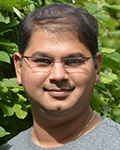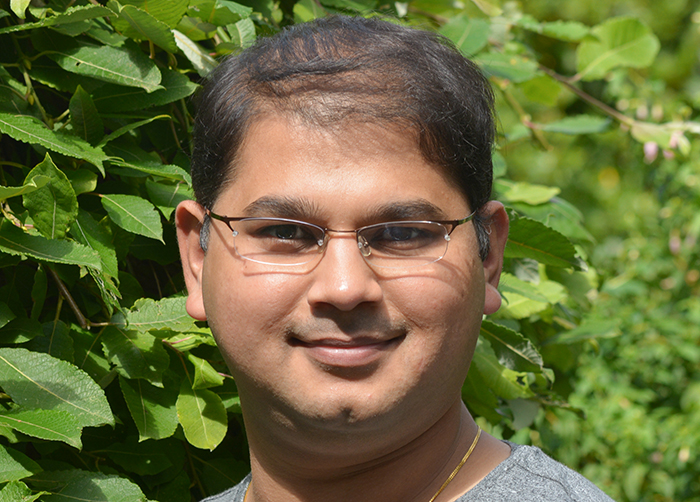We’re taking time over the following weeks to get to know the members of the GSA’s Early Career Scientist Committees. Join us every week to learn more about our early career scientist advocates.

Amey Redkar
Communication and Outreach Subcommittee
The Sainsbury Laboratory, Norwich, UK
Research Interest
Plant pathogens have a drastic impact on human health and nutrition, destroying around 23% of the agricultural production worldwide. Devastating plant diseases are on the rise, and recently emerging diseases can lead to complete crop loss. It is vitally important to investigate plant diseases and their associated pathogens to develop disease-resistant plants and to increase food yield. I work to understand the interaction of plants and pathogens during disease development. I am fascinated by how pathogens use specific genes to promote infection causing different symptoms. We call these genes pathogenicity genes and, by studying them, we are able to understand the genetic mechanisms within plants that pathogens target to promote the diseases that result in significant crop losses.
I focus specifically on a pathogen called Albugo candida, which causes white rust disease and is a serious threat in Asia, Europe, and North America since it can infect mustard, cabbage, and broccoli. It weakens the infected plant, enabling other pathogens to also invade the same non-host plant. While crop loss is a significant concern, additional threats arise by having multiple pathogens in close proximity to each other. This co-habitation within a plant increases the potential of the emergence of new strains of the pathogens, which could lead to expansion of the hosts a given pathogen’ can infect. I want to understand how pathogen become flexible enough to grow on different plant species. By identifying infection strategies and the host genes targeted by the pathogen, we will be able to generate crop plants that are resistant to this disease, thereby lessening crop loss.
As a PhD–trained scientist, you have many career options. What career paths interest you the most?
Because of my passion for academic science and through the research training I have acquired in studying plant pathogen interactions, I see myself as a Principal Investigator in an academic institution. The current developments in biological research and the emerging funding schemes for Junior Indian Scientists Abroad make India one of my top choices to pursue an academic career. I plan to continue my research on fungal diseases of plants to dissect the phenomenon of host sensing at cell-specific resolution. This is particularly relevant in the Indian Agricultural system, which has a massive diversity of crops and also diseases—particularly in pulses which serve as a main protein source for vegetarian diets. There are many questions yet to be explored on these topics, thus providing great opportunities for further research.
Any position that I pursue has to include an opportunity to develop young scientists. I see myself doing this in a dynamic research environment. I look forward to guiding the professional development of early career scientists beyond the research bench in areas such as leadership, management, writing, presentation skills, and more so they can excel on all grounds. During my training I have had opportunities to explore these skills, which make me realize the importance of having this holistic view in a research career. This would be extremely helpful in developing a new generation of early career scientists, to promote healthy, transparent, enthusiastic science with a worldwide collaborative effort.
In addition to your research, how else do you want to advance the scientific enterprise?
In society, the image of a scientist is often inaccurate. A common perception is that scientists are “superheroes” similar to those shown in fiction movies. While it is wonderful that these fictional roles work to highlight the importance and relevance of science, the true role of a scientist and the relevance of scientific work are largely unknown to the general public. As scientists, our responsibility is to communicate our findings to public in a way that makes them clear, allowing the public to be confident that they are receiving factual information from a reliable source. As with any type of information we consume, we interpret science with varying perspectives informed by our life experiences. Because of this variability in interpretation, we often see misunderstandings and mistrust between scientists and the general public.
I have been a part of the Year 10 Science Camp at the John Innes Centre, UK, and this program explains to students what it is like to be a scientist. This experience has been incredibly rewarding and has generated interest in science among teenagers while also providing a more accurate understanding of who scientists are, off of the movie screen. This understanding is important for more than just the perception of science: it also impacts our ability to recruit and retain the future scientific workforce. It can be difficult for undergraduates to know all of the options available in science. I feel like I can contribute in a small way by being a mentor within science. As a future mentor, I want to be available to junior scientists and to provide them career guidance that will help them make decisions that take their interests, values, and skills into consideration and teach them what career and training options are available.
As a leader within the Genetics Society of America, what do you hope to accomplish?
I am excited to be a part of this fascinating program and eager to share my thoughts/experiences of being a young researcher from Europe. I look forward to expanding my professional network by working with other early career scientists and the GSA board members serving as our advisors and mentors. It is exciting to be able to contribute to the GSA community and simultaneously develop mentoring and leadership skills which will help me to become a successful Principal Investigator.
As a member of the Outreach and Communication subcommittee, I look forward to working with other team members to launch exciting programs and to communicate major discoveries originating within the genetics community. This is an ideal opportunity to further develop outreach skills by presenting important scientific advancements to a broad audience. In the future, I would be interested in developing a way for young researchers worldwide to openly share their knowledge about techniques, genetic models, and resources, allowing for the rapid exchange of expertise to help the early career scientist community.
Previous leadership experience
- Speaker — Accessible Science Talk: Year 10 Science Camp for School Students, John Innes Centre, UK
- Postdoctoral Teaching and Learning Committee Member — The Sainsbury Laboratory, Norwich, UK
- Volunteer — Norwich Science Festival, UK
- Student Representative — University of Pune, India
Contact
- Twitter: @RedkarAmey
- Webpage: http://www.tsl.ac.uk/staff/dr-amey-redkar/































